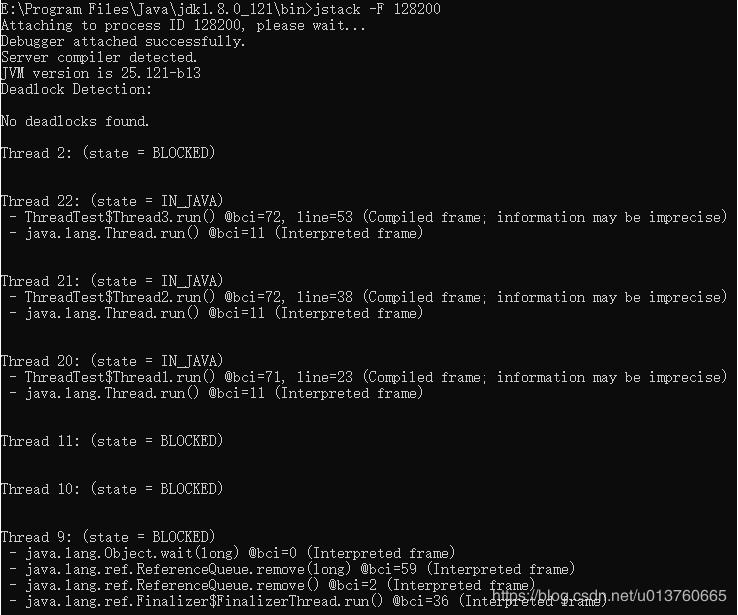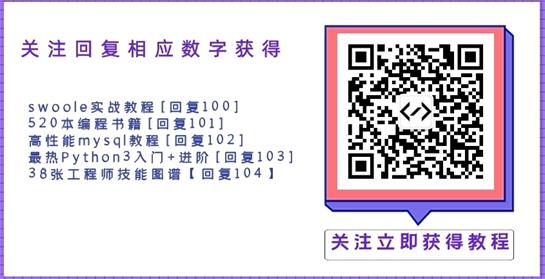首先打印1-100数字如果用一个单线程实现那么只要一个for循环即可,那么如果要用两个线程打印出来呢?(一个线程打印奇数,一个线程打印偶数)于是大家会想到可以通过加锁实现,但是这样的效率是不是不高?这里我用一个变量来控制两个线程的输出
public class ThreadTest {
volatile int flag=0;
public void runThread() throws InterruptedException{
Thread t1=new Thread(new Thread1());
Thread t2=new Thread(new Thread2());
t1.start();
t2.start();
}
public class Thread1 implements Runnable{
public void run() {
int i=0;
while(i<=99){
if(flag==0)
{
System.out.println("t1="+i+"flag="+flag);
i+=2;
flag=1;
}
}
}
}
public class Thread2 implements Runnable{
public void run() {
int i=1;
while(i<=99){
if(flag==1)
{
System.out.println("t2="+i+"flag="+flag);
i+=2;
flag=0;
}
}
}
}
}
那么如果要实现三个线程轮流打印1-100的数字呢?是不是也可以用上面的方法实现呢?代码如下
public class ThreadTest {
private int i=0;
private Thread thread1,thread2,thread3;
private int flag=0;
public void runThread() throws InterruptedException{
thread1=new Thread(new Thread1());
thread2=new Thread(new Thread2());
thread3=new Thread(new Thread3());
thread1.start();
thread2.start();
thread3.start();
}
public class Thread1 implements Runnable{
public void run() {
while(i<=100){
if(flag==0) {
System.out.println("t1="+i);
i++;
flag=1;
}
}
}
}
public class Thread2 implements Runnable{
public void run() {
while(i<=100){
if(flag==1) {
System.out.println("t2="+i);
i++;
flag=2;
}
}
}
}
public class Thread3 implements Runnable{
public void run() {
while(i<=100){
if(flag==2) {
System.out.println("t3="+i);
i++;
flag=0;
}
}
}
}
}
运行结果

发现三个线程只打印了一次就停止不输出了,是什么原因呢?
可以用jdk自带的jstack来看看线程的状态,在windows系统中可以打开cmd然后进入jdk所在目录,然后执行Jsp,能查看到各线程id,然后执行jstack -F pid就可以看的状态了

可以看到几个Thread state是BLOCKED,就是阻塞了,什么原因呢?
尴尬发现flag变量和i变量前面忘记加volatile,导致flag和i被线程读取修改时,其他线程不可见,所以才导致上面的问题出现。
在JVM中每个线程读取变量到cache中时相互都是不可见的,也就是java五大内存区中的程序计数器区域对于每个线程都是独立的不共享的,只有堆内存区和方法区是对所有线程都是共享的。
当线程1读取了flag和i的值,并对其进行修改的时候,线程2并发运行,并不知道flag和i值已经改变,导致多线程数据不一致的情况,所以加了volatile后,当线程读取变量进行修改后会“通知”其它线程这个值已经进行了修改。
import java.util.concurrent.atomic.AtomicInteger;
public class ThreadTest {
private volatile int i=0;
private Thread thread1,thread2,thread3;
private volatile int flag=0;
public void runThread() throws InterruptedException{
thread1=new Thread(new Thread1());
thread2=new Thread(new Thread2());
thread3=new Thread(new Thread3());
thread1.start();
thread2.start();
thread3.start();
}
public class Thread1 implements Runnable{
public void run() {
while(i<100){
if(flag==0) {
System.out.println("t1="+i);
i++;
flag=1;
}
}
}
}
public class Thread2 implements Runnable{
public void run() {
while(i<100){
if(flag==1){
System.out.println("t2="+i);
i++;
flag=2;
}
}
}
}
public class Thread3 implements Runnable{
public void run() {
while(i<100){
if(flag==2){
System.out.println("t3="+i);
i++;
flag=0;
}
}
}
}
}
运行结果

-----未完-----
补充知识:Java n个线程轮流打印数字的问题
一、两个线程轮流打印数字。
加锁实现:
package lianxi;
/*
* 用锁实现两个线程轮流打印1——100
*/
public class Print1TO100TwoThread {
private Object lock = new Object();
private int i = 0;
Thread threadA = new Thread(new Runnable() {
@Override
public void run() {
while (i <= 100) {
synchronized (lock) {
try {
if (i > 100)
break;
System.out.println("threadA :" + (i++));
lock.notify();
lock.wait();
} catch (InterruptedException e) {
e.printStackTrace();
}
}
}
}
});
Thread threadB = new Thread(new Runnable() {
@Override
public void run() {
while (i <= 100) {
synchronized (lock) {
try {
if (i > 100)
break;
System.out.println("threadB :" + (i++));
lock.notify();
lock.wait();
} catch (InterruptedException e) {
e.printStackTrace();
}
}
}
}
});
public void startTwoThread() throws InterruptedException {
threadA.start();
Thread.sleep(20);
threadB.start();
}
public static void main(String[] args) throws InterruptedException {
new Print1TO100TwoThread().startTwoThread();
}
}
用锁效率太低,用一个变量来控制打印的顺序。
package lianxi;
/*
* 用两个线程轮流打印1——10;用所实现效率太低,用变量来控制
*/
public class PrinntNumTwoThread {
private volatile int num = 0;
private volatile boolean flag = false;
Thread threadA = new Thread(new Runnable() {
@Override
public void run() {
while (true) {
if (num > 10)
return;
if (!flag) {
System.out.println("threadA-->" + ":" + (num++));
flag = !flag;
}
}
}
});
Thread threadB = new Thread(new Runnable() {
@Override
public void run() {
while (true) {
if (num > 10)
return;
if (flag) {
System.out.println("threadB-->" + ":" + (num++));
flag = !flag;
}
}
}
});
public void startTwoThread() {
threadA.start();
threadB.start();
}
public static void main(String[] args) {
new PrinntNumTwoThread().startTwoThread();
}
}
二、那么如果要实现三个线程轮流打印1-100的数字呢?
package lianxi;
public class PrintNumThreeThread {
private volatile int i = 0;
private volatile int flag = 0;
Thread threadA = new Thread(new Runnable() {
@Override
public void run() {
while (true) {
if (i > 100)
return;
if (flag == 0) {
System.out.println("threadA->" + ":" + (i++));
flag = 1;
}
}
}
});
Thread threadB = new Thread(new Runnable() {
@Override
public void run() {
while (true) {
if (i > 100)
return;
if (flag == 1) {
System.out.println("threadB->" + ":" + (i++));
flag = 2;
}
}
}
});
Thread threadC = new Thread(new Runnable() {
@Override
public void run() {
while (true) {
if (i > 100)
return;
if (flag == 2) {
System.out.println("threadC->" + ":" + (i++));
flag = 0;
}
}
}
});
public void startThreeThread() {
threadA.start();
threadB.start();
threadC.start();
}
public static void main(String[] args) {
new PrintNumThreeThread().startThreeThread();
}
}
以上这篇Java实现多线程轮流打印1-100的数字操作就是小编分享给大家的全部内容了,希望能给大家一个参考,也希望大家多多支持自学编程网。

- 本文固定链接: https://zxbcw.cn/post/194203/
- 转载请注明:必须在正文中标注并保留原文链接
- QQ群: PHP高手阵营官方总群(344148542)
- QQ群: Yii2.0开发(304864863)
